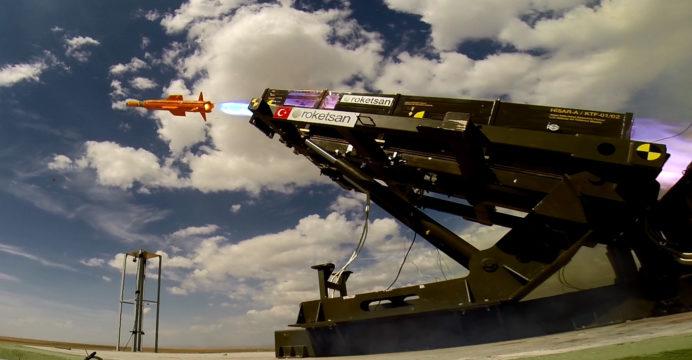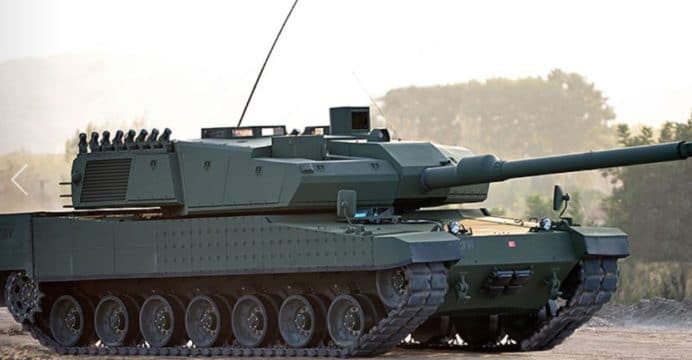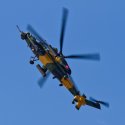timepass
Brigadier
TURKEY TEST-FIRES HİSAR-A SHORT-RANGE SAM....

Turkey’s Ministry of Defence announced that Roketsan and Aselsan had successfully test-fired the jointly-developed HİSAR-A short-range surface-to-air missile (SAM) system on 01 February.
In a statement, Turkish Defence Minister Nurettin Canikli said, “The Hisar project, which was developed using national facilities, provided 100% success in the tests.”
The HİSAR-A is powered by a dual-stage rocket motor, providing a maximum engagement range of 15 km. Its guidance suite comprises of a data-link-fed mid-course system coupled with an imaging infrared (IIR) terminal-stage seeker. The longer-ranged – i.e. 25 km – HİSAR-O uses the same suite.
The HİSAR-series is analogous in purpose and capability to the Denel Umkhonto-series and Diehl BGT IRIS-T SL. Turkey will use the HİSAR-A/O SAM along with the Korkut self-propelled anti-air gun (SPAAG) system for low-level anti-air warfare (AAW) coverage.
The HİSAR will also accompany the with the Turkish Army’s armour formations using a modified tracked infantry fighting vehicle platform built by FNSS Savunma Sistemleri A.Ş. (i.e. ACV-30).
The ACV-30 is expected to carry HİSAR SAMs along with Aselsan’s , an X-band active-electronically scanned array (AESA) radar with an instrumented range of 70 km.
Development of the HİSAR began in 2011, with the Turkish Undersecretariat for Defence Industries (SSM) contracting Aselsan to develop the radar, command-and-control and fire-control systems, while having Roketsan develop the missile and its propulsion system.
The SSM awarded Aselsan a $413.27 million US contract to supply short-range air defence systems – likely including the HİSAR-A and Korkut – to the Turkish Armed Forces. Its deliveries are expected to begin in 2019 and conclude in 2022.

Turkey’s Ministry of Defence announced that Roketsan and Aselsan had successfully test-fired the jointly-developed HİSAR-A short-range surface-to-air missile (SAM) system on 01 February.
In a statement, Turkish Defence Minister Nurettin Canikli said, “The Hisar project, which was developed using national facilities, provided 100% success in the tests.”
The HİSAR-A is powered by a dual-stage rocket motor, providing a maximum engagement range of 15 km. Its guidance suite comprises of a data-link-fed mid-course system coupled with an imaging infrared (IIR) terminal-stage seeker. The longer-ranged – i.e. 25 km – HİSAR-O uses the same suite.
The HİSAR-series is analogous in purpose and capability to the Denel Umkhonto-series and Diehl BGT IRIS-T SL. Turkey will use the HİSAR-A/O SAM along with the Korkut self-propelled anti-air gun (SPAAG) system for low-level anti-air warfare (AAW) coverage.
The HİSAR will also accompany the with the Turkish Army’s armour formations using a modified tracked infantry fighting vehicle platform built by FNSS Savunma Sistemleri A.Ş. (i.e. ACV-30).
The ACV-30 is expected to carry HİSAR SAMs along with Aselsan’s , an X-band active-electronically scanned array (AESA) radar with an instrumented range of 70 km.
Development of the HİSAR began in 2011, with the Turkish Undersecretariat for Defence Industries (SSM) contracting Aselsan to develop the radar, command-and-control and fire-control systems, while having Roketsan develop the missile and its propulsion system.
The SSM awarded Aselsan a $413.27 million US contract to supply short-range air defence systems – likely including the HİSAR-A and Korkut – to the Turkish Armed Forces. Its deliveries are expected to begin in 2019 and conclude in 2022.



